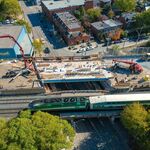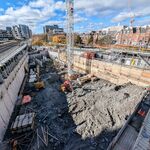In any case, I'm pretty sure there are some very efficient coping methods to deal with higher gas prices short of the suburbs going Mad Max. The most obvious is boosting vehicle occupancy. Two people is just a bit less than a 50% improvement in efficiency over single occupancy travel.
Simple reductions in horsepower, which I assume would inevitably flow from higher gas prices, could have similar effects. Not totally relevant to Toronto, but warmer jurisdictions could easily cut oil demand by moving towards vehicles like Vespas (which would make gas cheaper for us). These are my observations from looking at poorer cities. They tend to be just as sprawly as many North American cities (Joburg is a whole new level of sprawl), but their residents tend to have less than a quarter our incomes. They cope by using higher occupancy vehicles (usually Van-pooling, which as far as I can see is the most economic form of travel and part of why I keep scratching my head over the TTC monopoly), using vehicles with smaller energy outputs (i.e. Tata Nano, 33hp), and using more efficient travel plans (i.e. 4 day weeks).




